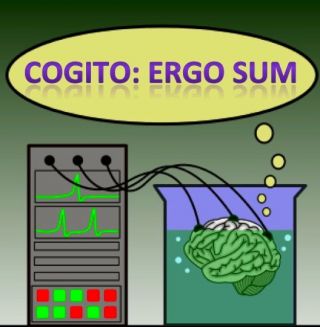Genetics
If Selfish Genes Build Brains, Why Aren’t We All Solipsists?
Conflicting parental genes save you from thinking you're the only reality.
Posted March 23, 2015

The Cartesian model of consciousness I was advocating in an earlier post epitomized in Descartes’ famous deduction, Cogito: ergo sum (I think: therefore I am) raises the issue of so-called solipsism: the belief that you are the only thing that really exists and that everything else is an illusion.
Clearly, Descartes' reasoning is all very well where the reality of your own consciousness is concerned. But it is a very different matter in relation to other people’s minds because you cannot directly know what others think. Instead, you have to deduce it from their behaviour and expressions, and this raises the problems seen, for example, in controversies concerning thinking machines, animal minds, or even brains in vats (above).
And if you think about it, the central pathology in autism spectrum disorder (ASD) reduces to much the same issue: the deficits that autistics have in relation to intuiting, understanding, and predicting other people’s minds and mental states. Looked at in this context, you could say that autism is a kind of behavioural, or implicit solipsism. This is something that is definitely implied by the etymology of the term, derived as it is from the Greek for self—not to mention by the deficits in empathy, social skills, and ability to see things from others’ perspective that are symptomatic of ASD.
Nevertheless, solipsism is not a doctrine that is taken seriously by most people. But why is this so? Surely, Darwinism would predict that, if the self is little more than the agent of its “selfish genes,” it should be programmed to act selfishly, and solipsism—or at least autism— would be an inevitable outcome if that self were also conscious. Why attribute consciousness to others who are agents of other genes, in competition with yours for a place in the future? Why not act as if you are the only conscious entity and avoid all the problems that come with attributing consciousness to others—not to mention the danger of letting other people get control of your consciousness as appears to happen, for example under hypnosis, in so-called “brain-washing,” and indeed normally in what in an earlier post I described as cloud cognition.
The first part of the answer is of course that the so-called “selfish gene” paradigm predicts altruism and self-sacrifice because relatives will share many “selfish” genes in common, and thereby have an incentive to co-operate. And this is almost certainly the evolutionary and genetic basis of social skills in particular and of mentalism in general.
Because mothers share half their genes with all their children, it is in the interests of maternal genes to have a mother’s children co-operate. Sharing a sense of consciousness as a mental agent with others is certainly a part of mentalism understood as an adaptation for social co-operation and interaction, and is crucial to basic mentalistic skills such as monitoring attention or intuiting intention. Indeed, here lies the ultimate genetic bed-rock of shared attention, empathy, and mind-reading in particular and of mentalism as a whole: brains built by similar genes will generate analogous minds and behaviour which will need to be able to recognize one another and co-operate to their mutual advantage.
Nevertheless, paternal genes need not take the same view of the individual’s altruism and co-operation. On the contrary, their genetic self-interest is likely to be more discriminating than that of the mother’s genes. Unlike the mother’s DNA, the father’s need not necessarily be present in any of a woman’s other children. As a result, we might predict that paternal genes would predispose the self to be more individualistic and more concerned with its own self-interest. The father's DNA would provide an internal, genetic counter-weight to the mother’s mentalism pulling in a more self-interested, “autistic,” and mechanistic direction—just as the imprinted brain theory predicts and as recent large-scale statistical tests using birth-size as a proxy for the expression of conflicting parental genes strikingly confirm. According to this way of looking at it, if maternal, pro-social genes save consciousness from selfishness and solipsism, paternal, more individualistic ones protect the self from exploitation by others and from too much credulity for top-down, mentalistic, group-benefit thinking. Indeed, as I pointed out in the previous post, there are reasons for suspecting a particular paternal reliance on genes expressed in the brain, and a definite preponderance of paternal gene expression in the brains of mice, and quite possibly also in man.
If this is so, here perhaps lies the ultimate genetic basis of the self as a separate, independent being: in the male, individualistic, mechanistic bias of the individual’s paternal genome by contrast to the female, collectivistic, mentalistic predisposition of maternal genes. Literacy may have given the self its voice and vocabulary of modern mentalism, but the mechanisms of genetic conflict ultimately enabled such an outcome and stamped it with the indelible imprint of the paternal genome. Indeed, here may also lie the basis of the Age of Asperger, with its cult of individualism, mechanistic cognitive configuration, and distrust of fascist, tribalist, or collectivist ideologies.

The implication of this is that, in the Cartesian theatre model of consciousness that I advocated in a previous post, the self views not simply the spectacle on the stage of the mind, but also the behaviour of the audience as well. Like theatre audiences in Descartes’ day (above), the spectators we are imagining are an unruly, noisy, fractious, and ostentatious crowd who attend not simply to see, but to be seen. According to the imprinted brain theory, they include a cultured maternal genomic claque applauding the holistic, mentalistic spectacle from the boxes and dress circle, while a plebeian paternal opposition clamours from the pit for a more mechanistic, Devil-in-the-detail denouement. Faced with such internal mental strife built into its own brain, the homuncular self peers down from its place high up in the gods, as much engaged by the spectacle in the theatre as by the drama on the stage.


